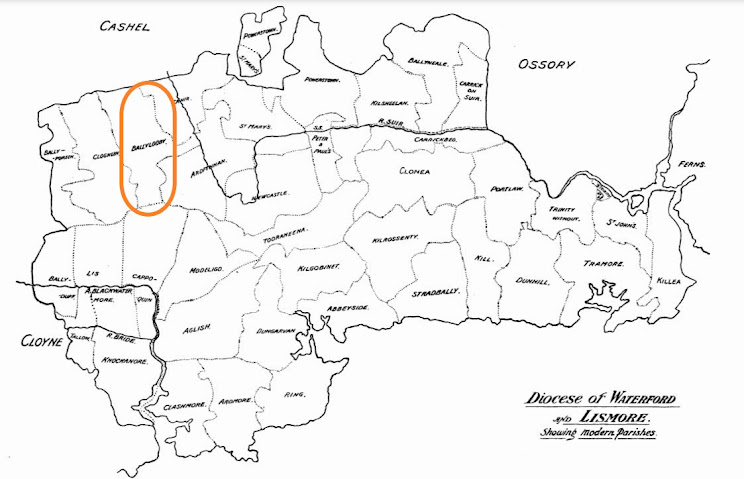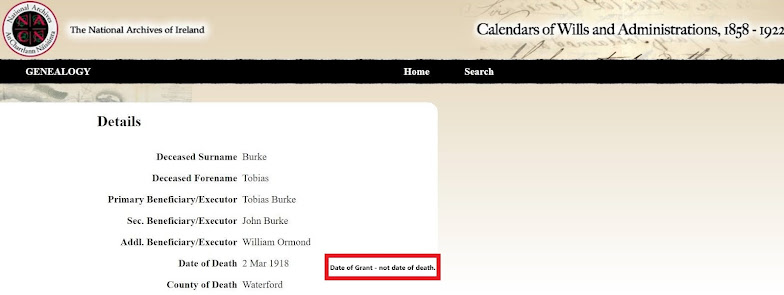This is the story of my maternal great grand uncle, Tobias Burke (1843 - 1917), the brother of my great grandmother Bridget Burke.
Our Common Ancestors are: James Burke and Catherine Crotty.
I've included Tobias in my 'Lonely First Names Club as Tobias is not a name that occurs very often in my family tree. As a matter of fact, my great grand uncle is the one and only family member on my extensive family tree with that name.
Apparently the name Tobias is of Greek origin and means "God is Good". Tobias is the Greek form of the Hebrew name Tobiah.
I have yet to uncover why my great grand uncle, born in Ireland, was given this name. I'm assuming it was a family name back in the generations that came before him (1700s), but it's extremely difficult finding records from that time in Irish history to confirm this assumption.
The name does not appear in any of the generations of the Burke line that followed him, at least none that I'm aware of or have found in my research.
Interestingly though, his name does match the way of life that Tobias followed when he became an adult.
 Up until the end of last year, I had very little knowledge about the life of Tobias. I had collected a few records and pieces of information from other family members and their family trees.
Up until the end of last year, I had very little knowledge about the life of Tobias. I had collected a few records and pieces of information from other family members and their family trees.
Facts / Records I had found up until the end of last year included:
Tobias Burke was born in 1843. He was the third-born son of James Burke and Catherine Crotty (my 2x great grandparents). When Tobias was born, James was 32 and Catherine was 29 years old.
Tobias was baptised on the 18th of April in the Carrick-on-Suir Parish, in County Waterford. He was born in the area known as 'Three Bridges' between the town of Carrick-on-Suir and the townland Tibberagany (also spelt as Tybroughney).
He grew up in this area, along with his older sister (my great grandmother), two older brothers and three younger brothers.
When Tobias was 21, in 1865, his older brother William left home, bound for Australia and he never returned. By this time all of Tobias's siblings would have been considering the options for their future as the small tenant farm they had grown up on would no longer have been able to support them in their adulthood.
It appears that Tobias left home sometime around 1870 to begin a religious vocation and receive the Sacrament of the Holy Orders. At least, this was the story that had been handed down orally over the generations.
Then .......
At the start of this year, I got lucky and stumbled upon a source of information I'd previously under-utilised - the 'Directories & member lists' filter on the Ancestry.com search page for an individual. I noticed there were hundreds of entries for a Tobias Burke, and I started clicking on a few randomly, looking for matches in dates and places.
This led me to the City and Regional Directories of Ireland, in particular Thom's Irish Almanac and Official Directory of the United Kingdom of Great Britain and Ireland for the year 1871.
It was there I found the name Tobias Burke in the index of the clergy of the Roman Catholic Church.
This Tobias was listed on page 1202, and the entry states he was a "curate" near the town of Carrick-on-Suir in the Diocese of Waterford and Lismore. The year, the area, the name all pointed to the possibility that this was my Tobias Burke, and that the family story had been founded in reality. I followed this trail and found out quite a bit about the adult life of Tobias.
All of a sudden, my Ancestry.com page on Tobias Burke exploded, and was filled with details I had never expected to uncover!
In the 1870s, which was the time period relating to the first entry in Thom's Directory for my Tobias, a Roman Catholic "curate" in Ireland was a newly ordained priest who had been assigned to a parish, but was subordinate to the parish priest. The parish priest was the one who had canonical responsibility for the parish and was installed by the Bishop of the diocese. The curate was appointed by the Parish Priest and would have acted as his support / assistant in all aspects of parish duties.
I found a short passage in a text called 'The Rise and Fall of Stations in Ireland', that provided a small insight into the life of a curate:
Stations
The story opens with the local parish priest announcing from the altar before the end of mass on Sunday that he will hold Stations Monday through Friday at the houses of five of his more substantial and respectable parishioners, whom he then proceeds specifically to name. On the appointed day, the parish priest and his curate arrive early in the morning, by which time the near neighbours have gathered. The priests then hear the confessions of the assembled penitents, men and women, while their clerk sets up the portable altar for the celebration of mass. When the confessions are heard, one of the priests celebrates mass, and the people receive communion. After mass, the priests and their clerk take their breakfast with their host, his family, and some of the more respectable of the neighbours, who have also been invited. After breakfast, the priests examine and catechize the children, and hear the confessions of those they had not been able to attend to in the morning. The parish priest then proceeds to collect his dues and any arrears that may have accumulated from the head of each household present. This period of religious instruction, additional confessions, and collection of dues continues until dinner time. At three o'clock, the clergy, the host, his family, and a number of specially invited local notables, clerical and lay, sit down to dinner, and for three or four hours there is considérable eating, drinking, and merry-making, which takes the form of spirited conversation, storytelling, and singing, usually fuelled by generous libations of whiskey punch. The routine was repeated at each house during the week, and the Stations usually continued from some six to eight weeks, depending on the extent and population of the parish. They were, moreover, normally held twice a year, just before Christmas and after Easter. Finally, it should be noted that Stations were essentially a rural phenomenon because in the cities and larger towns they were not held in private houses but in the parish churches and chapels. Such then is the barebones of the custom of Stations that evolved into a national system between 1750 and 1850.
"The Rise and Fall of Stations in Ireland, 1750 - 1850" pp.19-32 in 'Chocs et ruptures en histoire religieuse' by Michael Lagree.
Turning back a few pages in this 1871 edition of Thom's Directory, I found an exact location for Tobias, along with the name of the Parish Priest and the nearest town.
He was curate at Ballyneale Parish, near Carrick-on-Suir, under Parish Priest, John Dee. Tobias would have been 28 years old at this time. From this time onward, Tobias spent his religious life in the Diocese of Waterford & Lismore.
Tobias was the curate under Parish Priest Stephen Lonergan, but he was not the only curate this time. That likely indicates that this particular parish must have had a busier life than the previous one.
It appears Tobias spent another two years in this parish. During this time Tobias's mother, Catherine Burke nee Crotty, had died, and his youngest brother James had left home, bound for the United States. His younger brother John had married, and had started his married life close to Pilltown, in County Kilkenny.
By 1875 Tobias was the curate in the neighbouring Parish of Clogheen, under Parish Priest Patrick Meany.
In the following year, 1876, he can be found in the Parish of Rathcormack and Clonee, near Carrick-on-Suir once more.
He was still there in 1877,
and 1878.
The Parish Priest was Timothy Dowley, and again there was another curate, John Power, working in the parish alongside Tobias.
In 1879, I found Tobias had moved to the parish of Passage (also known as East Passage). He was to remain in this Parish for 15 years, from 1879 to 1894.
During the years 1879 to 1881, he was working with a Parish Priest named Edmund O'Donnell, which is another interesting piece of information, as I am descended not just from the Burke family, but also from the O'Donnell family. I'm not sure yet if there is a connection with this priest named Edmund, but I'm assuming it's highly likely.
The parish priest Edmund O'Donnell appears to have moved on, or perhaps had died, in 1882, as I found that Tobias was then working under the Parish Priest, John Crotty, and remained working under him from 1882 to 1887, in that same parish.
Interestingly, Crotty was Tobias's mother's maiden name, which could mean the parish priest was a relative of Tobias. I am of course also descended from a family named Crotty, so there's a chance I might be related to that parish priest as well.
From 1888 to at least 1894, Tobias was then working under Parish Priest Maurice Flynn. During this time, his older brother William, who had emigrated to Australia, had died, as well as his younger brother Maurice, who had stayed on the family farm n County Kilkenny.
In 1896 things changed significantly for Tobias when he became a parish priest himself, in the Parish of Kilgobinet.
Tobias had acted as a curate for 25 years, which seems a rather lengthy period of time to act in a subordinate role. Of course, given the times, the Diocesan Bishop likely had a very, very long list of priests in waiting as choices for parish priest positions that became available during Tobias's long period as a curate.
By the time Tobias was appointed Parish Priest by the Bishop, he was 53 years old.
As previously stated, Tobias was the parish priest in the Parish of Kilgobinet, near the town of Dungarvan. He was there for about four years, and perhaps not surprisingly, he had chosen a man named Michael Burke as his curate. A relative? Highly likely!
Tobias then moved on from the Parish of Kilgobinet. Information gleaned from the book titled 'Waterford & Lismore - A Compendious History of the United Dioceses' (published in 1937 and written by Patrick Power) states that the Reverend Tobias Burke became the parish priest of the Parish of Aglish, upon the death of the Reverend Matthew Walsh in 1899.
At the time Tobias was 57 years old, and that is where he remained until his death at the end of 1917.
Tobias Burke died on the 27th of October 1917, at the age of 74, in the townland of Curraghmoreen, County Waterford. All of his siblings had passed away before him. His two younger brothers, John and James, had passed away in 1902 and 1904 respectively.































No comments:
Post a Comment